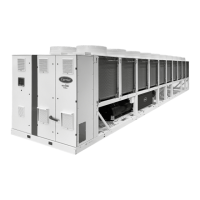Winter position
Unit
Water network
Closed
Closed
Open
IMPORTANT: Depending on the atmospheric conditions in
your region, you need to:
■ Add ethylene glycol in a suitable concentration to protect
the installation.
■ Where applicable, if a long period without use is expected,
drain and, as a safety measure, add ethylene glycol to the
exchanger via the drain valve located on the water inlet (a
drain is available on the water boxes either side of the
exchanger if the machine is not perfectly level).
■ Topreventcorrosionduetodierentialaeration,anyheat-
transfer medium circuits drained for longer than
1 month should be protected with a blanket of dry, inert
gas(0.5barmaximum).Iftheheat-transferuiddoesnot
meet the recommendations, a nitrogen blanket must be
applied immediately.
■ Atthecommencementofthenextseason,llthesystem
with water treated with appropriate corrosion inhibitors.
■ If additional equipment is added to the system,
the installer must comply with the basic recommendations,
especiallythe minimumandmaximumowrateswhich
must be between the values shown in the operating limits
table (application data).
■ If frost protection is dependent on electric heaters, never
de-energize the unit when frost protection is required.
■ To enable this, the unit's main disconnect switch and the
auxiliary circuit breakers protecting the heaters must be
left closed (see the wiring diagram for the location of these
components).
■ If it is not to be used in freezing conditions, or during a
prolonged period without power (whether or not this is
scheduled), the evaporator and the outside pipes must be
drained without delay
■ In case of prolonged non-usage, the hydraulic circuits must
be protected by circulating a passivating solution. (Consult
a specialist).
■ The evaporator temperature sensors are an essential frost
protection element: If piping trace heaters are used, ensure
the external heaters do not affect the measurements
provided by these sensors.
To check the heater circuit is “operational”. See Section 10
- “Standard maintenance”.
4.6 - Adjusting the installation nominal water
ow rate
Refer to the schematic diagram in the "Water connections"
paragraph for all item references in this chapter.
The water circulation pumps have been sized to allow the hydraulic
modules to operate in all likely system operating conditions,
i.e. at a range of temperature dierences between the water inlet
and outlet at full load from 3 to 10 K.
This temperature dierence required between the water inlet and
outlet determines the nominal ow rate of the system. Use the
specication provided when selecting the unit to determine the
system's operating conditions.
In particular, collect the data necessary for setting the installation
ow rate:
■ Unit without hydraulic module: The nominal pressure drop at
the evaporator connections. This is measured with pressure
dierential gauges that must be installed at the unit's inlet and
outlet (item 16).
■ Unit with variable speed pump – control on temperature
dierence: Nominal Delta T at the evaporator.
■ Unit with variable speed pump – control on constant outlet
pressure: Pressure at the hydraulic module outlet.
■ Unit with variable speed pump – control on pressure dierential:
Delta P at the hydraulic module connections.
■ Unit with variable speed pump – control on xed speed: Nominal
ow rate.
If this information is not available when activating the system,
contact the engineering and design department responsible for
the installation to obtain it.
Flow rates for a delta T of 5K at the evaporator can be found in
the product technical literature. Flow rates for any other delta T
(between 3K and 10K) can be obtained from the "Electronic
Catalogue" selection program.
4 - WATER CONNECTIONS
26

